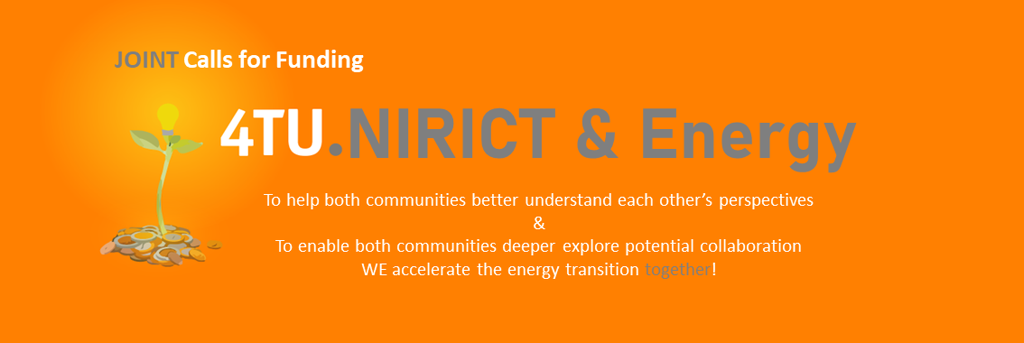
For this first joint calls for funding between 4TU.NIRICT and 4TU.Energy, we have received five eligible proposals. All of them are aiming for community building, and include collaborations between at least three universities out of Delft University of Technology, Eindhoven University of Technology, Twente University, Wageningen University & Research, and University of Groningen.
Among these five eligible proposals, two proposals have been selected to receive the funding based on the scoring criteria including the balanced outcome for both communities and the quality of the proposal.
We are glad to announce that the following two proposals achieved the highest scores and received our funding:
Co-Funded Projects by 4TU.Energy and 4TU.NIRICT
Towards a Research Agenda for Digital Twins of the Netherlands' Energy Systems
Towards a Research Agenda for Digital Twins of the Netherlands' Energy Systems
Applicant:
Dr. Nilufar Neyestani (TU/e); Dr. Nataly Bañol Arias (UTwente); Dr. Pedro P. Vergara (TU Delft); Dr. Tarek Alskaif (WUR)
Type of Funding:
Community Building
Proposal Summary:
The Dutch government has established energy policies such as the Dutch Climate Act and the National Climate Agreement to support the energy transition. These policies define directions to achieve CO2 emission reduction goals in five areas: electricity, transport, agriculture and land use, industry, and the built environment. This complex energy ecosystem requires a joint research effort from different energy sectors to provide innovative solutions to address the associated challenges. Digital Twins (DT) offer great potential to optimize energy systems and achieve sustainability goals. However, there is a lack of unified knowledge and alignment on this concept when targeting Dutch energy systems. To bridge this gap, we aim to bring together key stakeholders from the energy system (e.g., transmission and distribution system operators (TSO) and (DSO), companies, and knowledge institutions) and the ICT domain to share their experiences, challenges, and perspectives. With this Workshop series, the ICT and energy communities will gain deep insights into the underlying engineering and scientific challenges related to DTs for energy systems. This will enable them to identify the interplay (needs, connections, dependencies) across energy sectors and to develop holistic solutions to optimize and improve energy system performance with such DT models. In addition to enhancing system integration expertise for both communities, this Workshop series brings opportunities for collaboration on future DT-energy related research projects, fostering multidisciplinary collaboration with other key players, e.g., policymakers, regulators, and industry.
A workshop series (three in total, in 2025) will be organized to collectively reach a common understanding of DTs for energy systems and to identify the challenges in developing, implementing, and maturing such tools in the context of the Dutch energy transition. We aim to invite up to 50 guests with a balanced participation among academic institutions and industries and diversity in gender, background and seniority. And a final report with easy-to-understand infographics will be widely distributed.
Leveraging ICT for energy systems: Challenges and Opportunities
Leveraging ICT for energy systems: Challenges and Opportunities
Applicant:
NIRICT:
Dr. Aaron Ding (TU Delft), Prof. Kees Vuik (TU Delft), Dr. Alex Stefanov (TU Delft), Dr. Neil Yorke-Smith (TU Delft), Prof. Han la Poutré (TU Delft), Prof. Bert Zwart (TU/e), Prof. Valentin Robu (TU/e), Prof. Johann Hurink (UTwente), Prof. Nima Monshizadeh Naini (RUG)
Energy:
Prof. Peter Palensky (TU Delft), Dr. Jose Rueda-Torres (TU Delft), Dr. Jochen Cremer (TU Delft), Dr. Sergio Grammatico (TU Deflt), Prof. Koen Kok (TU/e), Dr. Phuong Nguyen (TU/e), Dr. Gerwin Hoogsteen (UTwente), Dr. Michele Cucuzzella (RUG)
Type of Funding:
Community Building
Proposal Summary:
Modern power systems, increasingly reliant on renewable energy sources, introduce a range of (cyber-)physical phenomena such as wide-area harmonics, sub-synchronous controller-based oscillations, and cascading failures. Traditional deterministic approaches are often insufficient to understand or control these dynamics fully.
Simultaneously, the ICT field has rapidly evolved, providing revolutionary tools such as AI and machine learning that can significantly enhance energy system analysis and management. These technologies allow for complex system modelling, predictive analytics, and real-time data processing, which are essential for addressing the dynamic challenges faced by modern energy systems.
By integrating the operational expertise of power engineers with the innovative capabilities of ICT professionals, digital twins can be developed as tools that mirror real-world energy systems in a virtual environment. However, realizing digital twins requires overcoming challenges related to data quality, computational capacity, and ICT infrastructure. 4TU is full of innovative researchers on energy and ICT, the two critical expertise needed to realize digital twins and other ICT technologies. The collaborative exploration of these technologies in workshops and symposiums will:
• Facilitate an exchange of ideas and research advancements within the Netherlands and globally, promoting a deeper understanding of existing and emerging ICT technologies for energy systems.
• Identify new industrial trends in energy systems and ICT that could accelerate the development and implementation of digital twins and other ICT technologies.
• Create new connections between the 4TU.NIRICT and 4TU.Energy communities and other partners, fostering opportunities for future collaboration.
The primary objective of this funding request is to organize a series of events that bring together experts from the energy systems and ICT domains to address current challenges in digital twins for energy systems.
• Symposium (approx. 100 participants): Keynote speeches by leaders in digital twin technology and renewable energy, panel discussions on current challenges and future directions and a networking event to facilitate further collaboration.
• Workshops (20-30 participants): Focused sessions on specific aspects of digital twins, such as integration with renewable energy sources, data handling and security, and the development of predictive models for system management.
This initiative will enable participants from diverse fields to become aware of the challenges and opportunities at the intersection of ICT and energy, potentially leading to groundbreaking solutions that leverage the strengths of both domains.
These two proposals are expected to report on their funded projects by the end of 2025.
We look forward to the collaboration between the two communities.
For questions, please contact:
Coordinator 4TU.NIRICT - Margje Mommers - Lenders
Coordinator 4TU.Energy - Sha Lou



